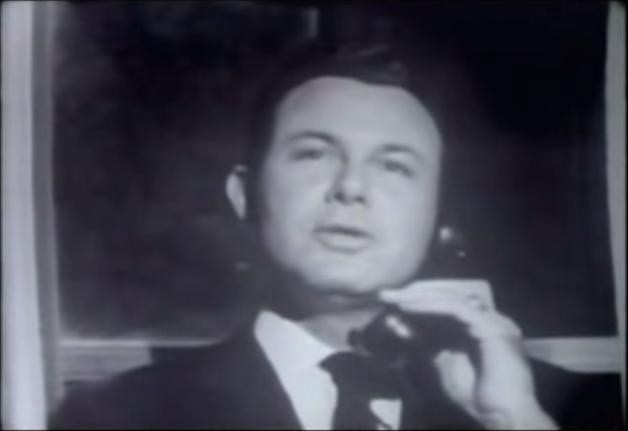The Original "Say My Name"
by Casey N. Cep

Joe Allison had trouble hearing his wife, Audrey, on the phone. “Put your sweet lips a little closer to the phone,” he’d say. One day, she wrote it down so they could turn it into a song. A singer called Jim Reeves recorded that song, “He’ll Have To Go” in October of 1959; it topped the charts by February of 1960.
“Put your sweet lips a little closer to the phone,” Reeves says, only he’s not a husband who can’t hear his wife, but someone whose someone is with someone else: “I’ll tell the man to turn the jukebox way down low,” he sings, “And you can tell your friend there with you he’ll have to go.”
It’s a ballad that sounds a little like a waltz, the piano and vibraphone twinkling throughout. “Whisper to me, tell me do you love me true,” Reeves asks and then demandingly: “Should I hang up or will you tell him he’ll have to go?”
Hard to believe anyone could say no to that baritone voice, or that that it would take any more convincing, but Reeves pleads: “You can’t say the words I want to hear while you’re with another man. Do you want me? Answer yes or no, darling, I’ll understanding.”
It was the original “Say My Name,” although Reeves doesn’t just suspect he’s pleading with a cheater, he knows there’s another man, and not just in the world, but in the room. There’s a difference, too, between when Destiny’s Child made their case in 1999 and when Reeves made his forty years before: in 1959, not everyone had a telephone, especially not in rural areas. Your neighbor might have one, or maybe you could walk to a pay phone, but part of the drama of “He’ll Have To Go” is it’s happening over telephone wires.
One of the first country songs to talk about the telephone was released by the Carter Family in 1929. “No Telephone in Heaven” is about a girl who asks a store clerk if she can call her mother in heaven, but two of the most popular phone songs in my country lifetime are Travis Tritt’s sassy “Here’s a Quarter (Call Someone Who Cares),” and Blake Shelton’s “Austin.” One’s a breakup and pay phone, the other a makeup and an answering machine.
But those all came later. In 1959, it was Jim Reeves pouring his heart out in some bar or restaurant, asking the proprietor to turn down the jukebox so he could hear his someone on the line. There were plenty of ways to break a partner’s heart in print, but hearing someone’s voice as they lied or refused to deny was still a relatively new experience.
“He’ll Have To Go” is a direct confrontation with infidelity, and while we have so many more ways of taking or faking calls, we’ve actually gone back to something like the days of telegrams and letters. Think of seeing some cheater’s tweet geotagged from your town, or realizing that your partner’s phone recognizes somebody else’s Wi-Fi network. You notice a familiar wallpaper pattern in the background of a Snapchat or see the same Foursquare checkin. Any one of those and you might well email or text to say “He’ll Have To Go,” just as someone in 1959 would’ve called, instead of saying so in person.
When phones invaded every house and every hotel room, Reeves’s song faded into familiarity, but now that they’re in every pocket and purse, it’s once again unfamiliar and strange. The sadness of “He’ll Have To Go” isn’t so much in realizing your someone is cheating, but having it confirmed by her sweet voice. Asking someone to put her sweet thumbs a little closer to the phone just isn’t quite the same.
Casey N. Cep is a writer from the Eastern Shore of Maryland.
